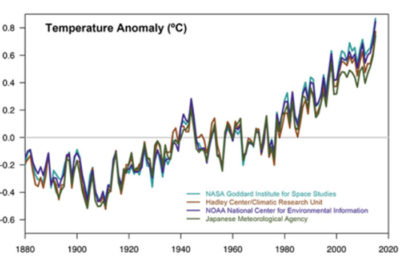Climate Change: No One is Exempt
Luckier Americans are insulated from many everyday worries, like struggling to pay the rent or mortgage on time. Some even enjoy life in gated communities, fine dining and first-class travel. But, just as money is no guarantee of happiness, neither is it assurance of protection against all of the frightening impacts of unchecked global warming.
 2016 was the third straight year that the Earth’s temperature was the hottest on record. Contrary to what one might hear in politicized discourse, climate scientists are nearly unanimous in concluding climate change is happening and is the result of burning fossil fuels for energy.
2016 was the third straight year that the Earth’s temperature was the hottest on record. Contrary to what one might hear in politicized discourse, climate scientists are nearly unanimous in concluding climate change is happening and is the result of burning fossil fuels for energy.
The United Nations and scientific organizations worldwide warn that effects of climate change are already being felt and that the Earth is more than half the way to a temperature increase of 2 degrees Celsius, beyond which runaway global warming will produce irreversible, catastrophic effects. Even worse, if global greenhouse gas emissions remain on their current trajectory, children living today can expect to experience the fallouts of a temperature increase topping 4 degrees Celsius by end of this century.
Despite such dire predictions, Americans, rich and poor, overwhelmingly believe climate change is not a threat to them personally. In a nationwide, county-by-county poll conducted in 2015, in not a single county did the majority of respondents believe climate change will affect them personally, though majorities in 99% of counties felt future generations would be.
The difficulty Americans have in understanding their own vulnerability to climate change stems in part from failing to see beyond the direct effects of climate change – heatwaves, droughts, storms and floods – to appreciate all the indirect effects on health and safety from air pollution, spread of infectious diseases, food and water shortages, population migrations and conflicts.
These indirect effects of climate change place everyone at risk.
Air Pollution
Along with heat-trapping CO2, burning fossil fuels pumps other pollutants into the air (sulfur dioxide, nitrogen oxides, particulate matter) that cause heart disease and respiratory illnesses like asthma, bronchitis and lung cancer. Burning coal also releases mercury, a neurotoxin harming infants and children.
In 2013, air pollution caused an estimated 5.5 million premature deaths worldwide. There is no atmospheric barrier between rich and less affluent communities, so air quality in Beverly Hills can be as poor as in neighboring central Los Angeles.
Spread of Infectious Diseases
The net effect of a warming planet will be to foster the spread of infectious diseases.
Altered ecosystems will encourage the breeding of vectors like mosquitoes responsible for outbreaks of vector-borne diseases (e.g., Zika, dengue, chikungunya). The incidence of both food-borne (E. coli, Campylobacter, Salmonella) and water-borne-infections (cholera. Giardia) should increase because warmer temperatures promote growth of bacteria and microscopic parasites.
Outbreaks of influenza will increase as people spend more time in close proximity indoors to avoid the weather. Exposure to zoonotic diseases carried by wild and domesticated animals (leptospirosis) might also increase from animal migrations or crowded living conditions.
Moreover, in an increasingly interconnected world, there is risk of spread of newly emergent diseases for which there is yet no cure. The recent scares over the Ebola and Zika viruses are sobering reminders.
Food and Water Insecurity, Population Migrations and Conflicts
By mid-century, world population is expected to approach 10 billion. There are several ways climate change will make meeting the resulting increased demand for food and water harder, as outlined in The Lancet Countdown, an international collaboration that tracts the health impacts of climate change.
Harvest yields are compromised by not only freezes, floods and droughts, but also by simple heat. For example, a recent study of effects of global warming on staple U.S. crops found that yields of maize, soybeans and wheat all suffer for every day temperatures exceed 30°C (86°F). Scarcity and price hikes of staples could become commonplace, even here in the United States, though lower-income countries more reliant on rain-fed agriculture would be hardest hit.
Much has been written about the role of food and water insecurity as sparking human migrations, civil unrest, international conflicts and spread of terrorism in the 21st century. Syria is a prime example of how climate change intensified the worst drought in the nation’s history (2007-2010). The consequent food and water shortages fostered eruption of the ongoing civil war and spread of radical groups like ISIS and Al Qaeda.
In 2014, the U.S. Defense Department formally recognized that climate change exacerbates destabilization of foreign governments and terrorism, thus threatening the security of the United States.
Take Action
Even if we remain unconvinced that climate change could negatively impact our own health and safety, it is incumbent upon us to leave future generations a livable world. All that’s required is the political will in Congress to put a price on carbon emissions to move the economy from one based on burning fossil fuels to one based on clean, renewable energy sources.
Call or write your congresspersons to say you expect them to address climate change, aggressively and now.
